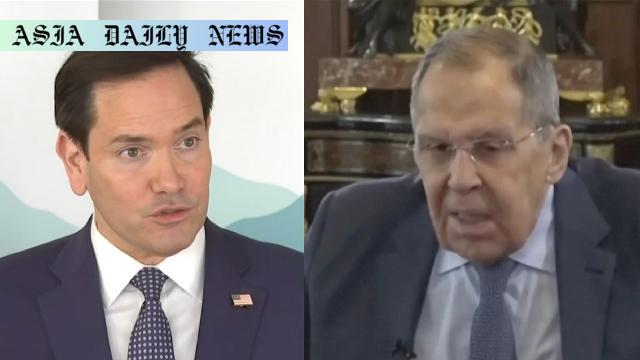Ukraine Talks: Rubio discusses US and Russia ties amid Red Sea tensions and Houthi attacks.

Introduction: Navigating Complex Geopolitical Dynamics
The latest dialogue between US Secretary of State Marco Rubio and Russian Foreign Minister Sergey Lavrov highlights the intricate balancing act of modern geopolitics. During a recent telephone call, the two leaders discussed a wide array of pressing international issues. Ukraine remains at the forefront of these discussions, as the lingering conflict poses significant implications for global stability. Furthermore, tensions in the Red Sea, spurred by Iran-backed Houthi attacks, add another layer of complexity to the already strained US-Russia relationship.
Touching on the Ukraine Crisis
Rubio’s emphasis on initiating dialogue with Lavrov underscores the United States’ commitment to finding a peaceful resolution to the Ukraine crisis. The US has been actively mediating efforts toward a ceasefire between Ukraine and Russia, despite the tenuous nature of their bilateral relationship. Observing the situation in Ukraine, the dialogue appears hopeful, with both leaders agreeing to work on restoring US-Russia communication channels. This positive development might act as a foundation for more robust diplomatic measures.
Addressing Houthi Aggression and Red Sea Stability
A significant portion of the discussions between Rubio and Lavrov revolved around the ongoing military campaign against Iran-backed Houthis. Rubio expressed that continued Houthi aggression, notably their attacks on US commercial and military shipping in the Red Sea, would not be tolerated. This serves as a clear warning about the United States’ readiness to defend its regional interests. Meanwhile, Rubio remains vigilant in ensuring this topic does not derail the ongoing dialogues with Russia, as Moscow maintains long-standing political and military connections to Iran. These interactions demonstrate the delicate interplay of diplomacy and national security in shaping US foreign policy.
Maintaining US-Russia Relations Amid Rising Tensions
The United States appears to be striking a careful balance between advancing its broader geopolitical objectives and avoiding antagonizing Russia. While tensions persist over differing stances on global conflicts, including Ukraine and Iran’s influence through the Houthis, moments of diplomatic engagement provide a glimmer of hope. Rubio’s conversation with Lavrov showcased the importance of nurturing open channels of communication, even amidst disagreement. It aligns with recent reports from Saudi Arabia that emphasize productive meetings focused on easing tensions in Ukraine.
Trump’s Optimistic Take on the Ceasefire
Adding further optimism, former President Donald Trump commented on social media about the productive series of meetings related to the Ukrainian ceasefire. While his involvement in the current administration’s foreign policy is minimal, Trump’s statements reflect a broader perception that diplomatic efforts are moving in the right direction. His sentiments mirrored Rubio’s cautious optimism, suggesting that deliberate and calculated negotiations could yield fruitful results.
Conclusion: Achieving Sustainable Solutions
In conclusion, Rubio’s engagement with Lavrov demonstrates a thoughtful and multilateral approach to resolving international conflicts. Addressing challenges such as the Ukraine crisis, Houthi aggression, and broader US-Russia tensions requires a careful mix of diplomacy, strategic foresight, and unwavering commitment to stability. While the road ahead remains fraught with challenges, the recent communications offer an encouraging step forward. Sustained dialogue and cooperative endeavors may yet lead to breakthroughs essential for global peace and security.
Commentary
Strengthening Diplomatic Efforts Amid Complex Relations
The discussion between Secretary Marco Rubio and Sergey Lavrov arrives at a pivotal moment in US-Russia relations. As the global community observes the developments in Ukraine, it is clear that dialogue remains a cornerstone of any potential resolution. Rubio’s willingness to engage directly with Lavrov despite ongoing tensions showcases the United States’ commitment to pursuing peace. This approach could lead to a reestablishment of trust between the superpowers, even if only incrementally. Such efforts stand as a testament to the value of persistent engagement in international diplomacy.
Balancing Red Sea Concerns with Broader Objectives
While Ukraine takes center stage, Red Sea tensions underscore the interconnectedness of global politics. Rubio’s acknowledgment of Houthi aggression marks a significant stance on defending US and international shipping routes. However, his careful calibration of actions against the Houthis with the broader US-Russia dynamic is noteworthy. Such diplomacy reflects the complexity of managing not only bilateral relations but also the ripple effects on other geopolitical arenas. Rubio’s handling of these parallel challenges is commendable, as it demonstrates the importance of prioritizing long-term stability while addressing immediate security concerns.
Remaining Optimistic and Encouraging Progress
It is worth noting the optimism conveyed during and after these talks. Reports from Saudi Arabia about productive ceasefire discussions and Trump’s social media remarks indicate a renewed momentum toward conflict resolution. Even as challenges remain, the tone of cautious hope and determination is a refreshing contrast to the often bleak outlooks on international affairs. Diplomacy is undeniably a long-haul process, but clear communication and partnerships are small victories that pave the way for broader success. Rubio has underscored the value of these actions, reaffirming the significance of perseverance in a fragile geopolitical climate.


